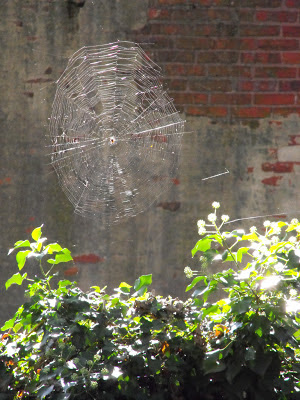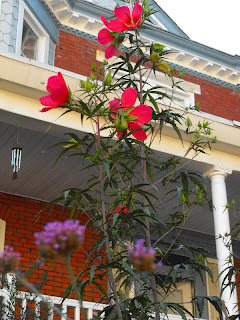Sometimes, it's what we say.
Other times, it's how we say it.
One day this week I encountered one of my students on the street. We exchanged pleasantries. He is on a sports team and missed the previous day's class because of a tournament. I asked about the team's performance, and he reported they won.

"That's so great! Congratulations!"
"Thanks," he replied. "So we're going to the finals next week, which means I won't be in class on Tuesday. Oh well." {
Oh well was voiced in a particular
blasé tone.)
"I see."
Did you have to say 'oh well', which is the linguistic equivalent of unceremonious dismissal? Really?
And then came the unexpected.
"So, about yesterday. Did you, uh,
say anything important?"
Ahem. What?!
Did. You. Uh. Say. Anything. Important.
He did not ask the faculty-despised,
de rigueur question asked by this generation of American students: "did I miss anything important?"
Instead, he opted to impugn and diminish my very existence in the classroom.
I quickly abandoned the ship of support and enthusiasm, which had foundered
on the shoals of his pitilessness, opting instead for salvation on the lifeboat of ill-will.

Yet my inner censor (which rarely acts the way it is supposed to act) hampered my venomous stream of profanity and invective from assaulting his iteration of idiocy. No. I did not treat this as a teaching moment, indicating why his question was inappropriate. As usual, I sublimated my needs, along with my anger/frustration, and redirected it inward. Translation: I tasted a trickle of my own blood, as I clamped down a little too hard and caught my inner lip on incisors.
My inner bitch raged.
"You'd better get the notes because I went over material that is on the quiz tomorrow."
"Huh? Quiz? Oh, yeah, that's right," he grunted and then chuckled.
I omit my dirty thoughts.
The exchange brought to mind a series of other exchanges in which language and silences compelled mini-existential crises and varying degrees of misanthropy to germinate.
"Why do you garden?"
Oh no, dear reader, the question is not innocuous. The question stings.
My
Downton Abbey / Howards End / name-your-English-country-manor-period-film-bred sensibilities are offended when asked
that question.
But let me be clear: it is not the question that rattles my peace and irritates my soul. I actually welcome it when truly the interrogator is genuinely interested in the act of gardening. No: it is the tone in which it is oft delivered and the manner in which it is oft asked, for the question, as it has been asked of me, never had anything to do with me (why
I garden; what gardening
means to
me), but became an
opportunity for others to exercise their
narrow-minded-bred judgmental haughtiness.
Truth be told: I refer not to one specific instance, but to several.
In one instance, my inquisitor followed up the question with an explanation: "Isn't it a waste of time? I mean, I have so many other things to do that the last thing I have time for or want to do is to go into the yard to do
that."
No Interpretation is necessary. [By the way, dear gardener-reader,I hear you. I hear our collective iteration, 'No wonder your property looks like...']
In another encounter, the person with whom I spoke issued an innocuous qualifier--"I have a black thumb"--which tempered the initial query which was delivered with an incredulous tone.
Charitable interpretation: "
this point has nothing to do with why I garden, but thanks for the indirect compliment."
Unsympathetic interpretation: "
Oh, so you think you're better than everyone else, eh? Most normal people have limited abilities.
Show off."
Once someone--a fellow academic, so this was an instance of the pot calling the kettle black--immediately scoffed upon asking the question (which dripped with palpable disdain), "It's
sooo anti-social." That was a conversation stopper, as he turned and walked away. I thought of two rhyming words, both ending in -ick.
Yes, dear reader, I am a very dirty gardener.
And, on fourth occasion, my interlocutor surpassed my elitism by indicating that he hired someone to do "that work" for him, incredulous that I'd actually get my hands dirty. (Of course, I should have shoved my hands in his face, declaring that I occasionally land my hands in a pile of soft, mushy Gramsci-poo fertilizer.)
Uncharitable interpretation: I cannot comment. I assume the reader intuits the bile seething from the screen.
Whoa. Not very becoming for my first blog entry after so long an illness-and-work-imposed hiatus.
What a curmudgeon, my dear reader must be thinking.
There is a point in all of this: individual human beings find relevance and meaning in a range of activities, and while we may question others about the derived value of such activities, we really ought to exercise our internal censors and prohibit questions with such judgments at their base, or as in the first anecdote, think more carefully about how we frame our queries and comments.
So I found delight in today's news: the American President visited Myanmar. And he spoke with reporters with Daw Aung San Suu Kyi in her manicured garden. Dan Rivers of CNN summed it up best:
miracles in Suu Kyi's garden.
She remained under house arrest for nearly 15 years. Her garden and her house became a prison. But the garden, I surmise, served also as her source of a liberation, an enjoyment and mental escape from confinement, an object of care and concern when her own family had been exiled by the military leaders and her activity strictly monitored and curtailed.
One famous photo, taken by the famed photojournalist Steve McCurry in 1996, captures a moment that speaks a universalism: Suu Kyi reading in her garden.

McCurry noted with respect to the photo: "everywhere I go in the world, I see young and old, rich and poor, reading books. Whether readers are engaged in the sacred or the secular, they are, for a time, transported to another world."
I surmise the photo was staged. But no matter. One can imagine this a natural exercise for someone confined for nearly 15 years.
While his commentary emphasizes less the garden, I cannot help but think that each of the beds, and the garden in its entirety, creates a context or a permissive atmosphere of escape.
I thought of
The Garden:
a documentary by Scott Hamilton Kennedy about a vast, 14 acre community garden in the middle of Los Angeles that emerged as a healing experiment in the aftermath of the 1992 LA riots.
Anti-social? Hardly. It brought people together and engendered a community in an otherwise violence ridden, impoverished section of the city.
A waste of time? Stupid comment, as it generated food for a developing community.
Solipsistic? Think about it. Gardening teaches us the art of care, no matter if one is confined or if one tends the soil with a multitude of others. And care has eminently social effects.
In that space--whether it be in a garden or in a book, at a sports event or in a museum, in a yoga or an art class--we may think unencumbered. We may rejuvenate. We may erase the troubles and stresses and anxieties of the world.
And yes: if only briefly, we have stolen a moment of time to shine our armor, to replenish our reserves to repel all of the idiocy and stupidity and judgments of all those around us, and master an art of living appropriate to our individual lives.

















































